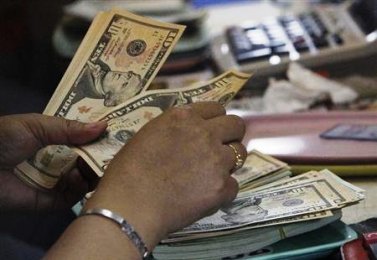IMF urges Sudan to allow exchange rate flexibility
September 11, 2014 (KHARTOUM) – The International Monetary Fund (IMF) deputy director of the Middle East and Central Asia department, Edward Gemayel, has called on the Sudanese government to allow market forces to determine the exchange rate as opposed to fixed pricing.

One US dollar trades for around 9.5 pounds in the black market compared to an official rate of 5.8.
“Do you know anyone dealing at the official rate? Companies, individuals, importers and even the central bank depends in its purchase of gold on the parallel market [price]” he added.
The IMF official dismissed any negative impact that could result from this policy and emphasised that the market mechanism will determine the price and called on the central bank to follow this step, especially since the official price remained constant while the black market rate kept changing.
Sudan has been struggling to narrow the gap between the official and black market rates of foreign currency exchange which has been widening since the country lost its main source of hard currency revenues due to the secession of the oil-rich south in July 2011.
But because of the low Forex reserves held by the Central Bank of Sudan (CBoS), its ability to intervene to support its currency remains very limited.
Gemayel also attributed the economic crisis in the country to the shock that occurred after the secession of South Sudan.
He went on to say that inflation rose to levels not seen or witnessed since the mid-1990s, but noted that Khartoum has developed bold policies recently to address the deteriorating economic situation which resulted in positive indicators in the first half of the year.
An IMF report last month stated that revenue increased by more than 60% in Q1 2014 compared to same period last year.
“This performance reflects the increase in tax revenue and fuel stabilization fees. Tax revenue amounted to 1.5 percent of GDP, up from 1.3 percent of GDP in the first quarter of 2013,” the IMF said.
Double-digit inflation has been one of the most visible features of the Sudanese economy in recent years.
To makes matters worse, the government phased out subsidies twice in 2012 and 2013 on petroleum and food products, triggering demonstrations that were swiftly quelled.
The IMF nonetheless says it that it expects inflation to “continue its downward trend thus bringing consumer price inflation down to single digits”.
“Twelve-month inflation fell to 35.7 percent at end March, from 41.9 percent at end December 2013, mainly reflecting lower food prices,” it said.
On the issue of external debt, Gemayel said that the deadline to reach an agreement with South Sudan has passed last month with no positive outcome.
He advised Khartoum and Juba to extend the period once again to sit down with creditors and reach out to them in order to reach a settlement.
“We cannot exempt Sudan’s external debt nor are we able to decide on [debt] exemption or not and this is known to everyone,” Gemayel said.
He pointed out that the IMF is there to assist in the provision of technical support and to present an accurate picture of the economic situation in the country in order to facilitate talks with creditors.
He underscored the need to communicate with creditors in order to reach a comprehensive settlement and listen to their terms and convince them with debt relief.
Khartoum inherited the entire external debt that existed prior to the secession of the south. The two countries have yet to agree on how to split up the debt.
Both sides decided to reach out to creditors to obtain debt relief and if that fails will sit down to see how it can be divided using the “zero option”.
Around three quarters of Sudan’s $45 billion external debt are owed to the Paris Club of creditor nations and other non-member states. The remaining balance is equally divided between commercial banks as well as international and regional financial bodies.
(ST)
